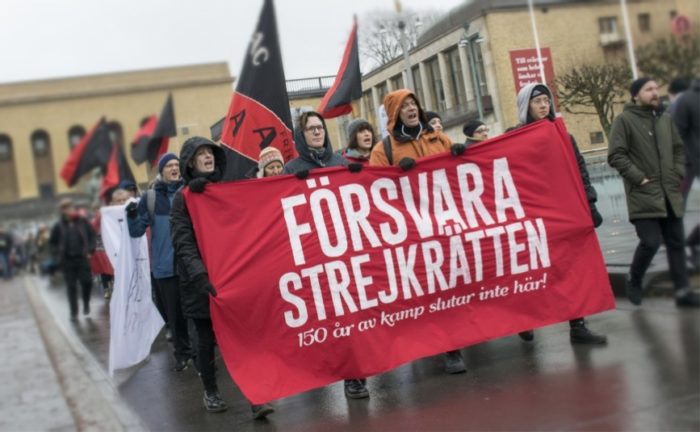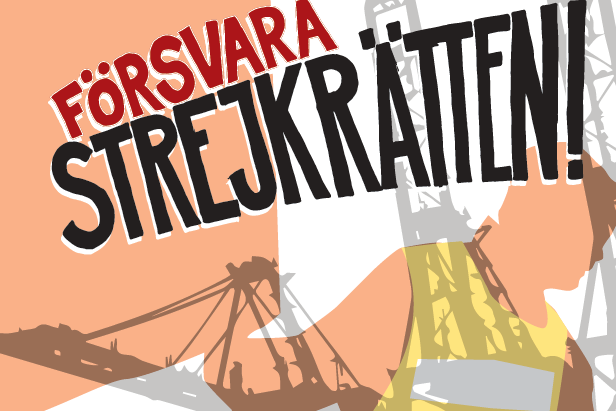Ya' Cousin Cleon
OG COUCH CORNER HUSTLA

By Gabriel Kunh and Micke Nordin
The resurgence of – true or self-proclaimed – socialist movements in the Global North has implied very generous interpretations of life in the Nordic countries. Sweden, in particular, has often been hailed as a model for the “democratic socialism” espoused by Bernie Sanders and others.
It is true that the legacy of Sweden’s strong working-class movement and social-democratic governance makes the welfare state somewhat more resilient than in other countries. Sweden still enjoys a relatively high level of unionization, government funding for equal opportunities in education, employment, and the arts, universal health care, free education, and so forth. Sweden also ranks high when it comes to the implementation of the rights of women and LGBTQ people, it has relatively liberal immigration policies, and it dedicates an above-average percentage of its GDP to development projects in the Global South. All of this rightfully appeals to people embracing socialist values of equality and internationalism.
But Sweden has been marked by the neoliberalist era as much as any other country. In the 1990s, the Social Democratic Party – which has been governing the country, with short interruptions, since the 1920s – embraced New Labour-type policies, privatizing huge parts of the public sector, including clinics, schools, postal services, the transport system, and council flats. The center-right government that ruled the country from 2006 to 2014 accelerated these developments. In Stockholm, the percentage of council flats in available housing dropped from 75% in 1990 to 45% in 2015. Prices on the private market have skyrocketed, which has reshaped the city’s entire social fabric. Across the country, eligibility for unemployment and invalidity benefits have been cut substantially. And the once powerful unions have been losing much influence, not least due to large economic sectors being absorbed by the gig economy (from delivery, cleaning, and catering to cultural, academic, and IT work).
The “Peace Obligation” Proposal
If any further proof was needed both for the misperception of Sweden as a quasi-socialist country, the increasing attacks on the workers’ movement’s achievements, and the class betrayal of the Social Democratic leadership, it has been delivered by a June 2018 proposal to rewrite important sections of Swedish labor law. The proposal carries the title “Peace Obligation at Workplaces with Collective Bargaining Agreements, and in the Case of Litigation.” It was conceived in a joint effort by the Confederation of Swedish Enterprise and the country’s biggest trade union associations, and turned into a proposal for legislation by the Swedish Ministry of Labor, headed by the Social Democrat Ylva Johansson.
The summary of the 68-page proposal includes the following lines:
“This text proposes that an employee must not engage in an industrial action against an employer who has signed a collective bargaining agreement with another union, that is, an employer who is already bound by a collective bargaining agreement. The text proposes that industrial action shall only be lawful if its purpose is to establish a collective bargaining agreement implying a peace obligation, and if the demands attached to the industrial action have been negotiated with the employer beforehand. … The bill furthermore proposes an extension of the prohibition against industrial action during litigation. The current prohibition only applies to employers and employees bound by collective bargaining agreements when engaged in legal cases relating to these agreements. This text proposes that the ban shall also apply to employers and employees who are not bound by a collective bargaining agreement.”
In layman’s terms, this renders all forms of industrial action illegal apart from attempts to force employers to sign a collective bargaining agreement if they haven’t done so before – and even in this case, workers and their organizations need to come to the negotiation table first.
The Consequences For Workers
In order to understand how far-reaching the consequences would be if this proposal was to become law, we need to look at what the Swedish Labour Court has classified as “industrial action” over the years. In a 2005 verdict, the court declared that “basically any action – or lack thereof – that can have an impact on the party against which it is directed, can be considered an industrial action.” This can practically encompass anything. Indeed, we find that in certain cases, the Swedish Labour Court has classified actions such handing out leaflets and writing opinion pieces as industrial actions. If, as the proposal suggests, actions like these will become illegal in connection with pretty much any labor dispute, then out-of-court actions – or mere declarations – of solidarity with workers who have been harassed or discriminated against will become illegal, too.
The consequences of violating the legal code are already unevenly divided between capital and labor. According to Swedish labor law, employers can avoid legal proceedings in the case of, for example, unlawful sackings [firings] by offering compensation payments. Workers do not get off that easily. Unions can, for example, be made liable for all alleged losses that employers suffer as a result of unlawful industrial action directed against them. Once almost all forms of industrial action will be outlawed, entire workers’ organizations can be ruined.
“Class compromise runs [deep] in Swedish society. It was first cemented at the 1938 Agreement between the Swedish Employers Association and LO, the biggest of the national trade union confederations and, to this day, strongly tied to the Social Democratic Party.”
It must also be stressed that, according to the proposal, employers will not be forced to sign collective bargaining agreements with majority unions. It is up to them to decide which union they want to sign an agreement with, and this agreement will then be binding for everyone else. This is, essentially, a license for establishing so-called yellow unions: unions that are initiated by employers to ensure that labor laws are met while the employers retain full control over them. In a piece for the Transnational Social Strike(TSS) website, the organizers of a TSS conference in Stockholm in November 2018 described this graphically: “This means that an employer can invite any number of workers just to sign an agreement and then force all others to follow its peace treaty. The owner could essentially employ his/her cousins or buddies, settle the worst possible deal and from then on criminally charge anyone who takes action against it.”
The “Peace Obligation” proposal is also deceitful. One example concerns the consequences for employment equality. Under the header “Consequences for the Equality Between Men and Women,” the proposal claims that “more men than women” will be affected by it. The reason given is “the division of gender within the transport and construction industries.” Leaving aside the unsettling suggestion that more gender equality can be reached by curtailing the rights of men rather than by extending those of women, this assertion is simply not true. A report by the National Mediation Office – which is regularly cited throughout the proposal – clearly states the opposite: “During the period in question [2000-2016], most cases of such conflict [involving industrial action] occurred among cleaners (about 50), followed by hotel and restaurant workers (about 45), longshoremen (about 35), construction workers (about 30), in the retail business (about 30), and in heavy industry (about 20).” In short, the industries most affected if the proposal becomes law will be industries dominated by women. This stands in glaring contradiction to the proposal’s claims.
It is also questionable how the proposal can be reconciled with the International Labour Organisation’s Convention 87, titled “Freedom of Association and Protection of the Right to Organise.” The convention, ratified by Sweden in 1949, requires all ratifying countries “to take all necessary and appropriate measures to ensure that workers and employers may exercise freely the right to organise.” It further states that “the law of the land shall not be such as to impair, nor shall it be so applied as to impair, the guarantees provided for in this Convention.” Now, in practice, the right for Swedish workers to join particular labor organizations will be rendered meaningless if these organizations have no right to act. The conundrum becomes particularly obvious if we look at how “freedom of association” is defined in Article 11 of the European Convention on Human Rights, ratified by Sweden in 1953: “Everyone has the right to freedom of peaceful assembly and to freedom of association with others, including the right to form and to join trade unions for the protection of his interests.” Yes, workers should be able to join trade unions for the protection of their interests, not just for the heck of it.
If, as suggested by its authors, the “Peace Obligation” proposal will become law by January 1, 2020, independent unions that have not yet come to power-sharing agreements with the ruling class – or that have no interest in ever signing any such agreements – can no longer act as unions. The syndicalist SAC, for example, opposes signing collective bargaining agreements due to the stipulations that already come with them according to Swedish law, for example non-strike agreements and other restrictions on their activities.
If the “Peace Obligation” proposal becomes law, industrial action will pretty much disappear from a country where it already has become rare given the social-democratic institutionalization of the workers’ movement. Since the 1980s, the number of strike days has steadily decreased. In 1986, there were still 682,652 strike days registered. In 2017, there were 329. The SAC, with a modest membership of 3000 people, often tops the annual list.

The Political Context of Class Compromise: Rehn-Meidner
The 2017 strikes at the Port of Gothenburg, led by the Swedish Dockworkers’ Union, are often considered as the events that triggered the “Peace Obligation” proposal. The Swedish Dockworkers’ Union, one of Sweden’s biggest independent unions, has been denied collective bargaining rights since it split from the Swedish Transport Workers’ Union in 1972. This has led to repeated labor unrest at the Port of Gothenburg, Scandinavia’s biggest. The purported loss for Swedish industry caused by the 2017 strikes was estimated at half a billion US dollars.
However, the conflict at the Port of Gothenburg mainly served as an excuse for the ruling class to move its positions forward. Already in 2005, the Confederation of Swedish Enterprise had published a report with the revealing title “The Swedish Model Has Capsized.” Its authors bemoan the unfair advantage that trade unions allegedly have in Sweden vis-à-vis industry, or, to use the report’s official wording, “the imbalance between the partners on the labor market.”
In a campaign called “Advantage Sweden,” the Confederation of Swedish Enterprise offered its proposals for rectifying this perceived imbalance. An April 2005 press release was very clear: “Today, it is easy for unions to call strikes. … But order on the labor market is important for the competitive power of Swedish companies, and for Sweden to remain an attractive country for companies. Our campaign addresses the conditions under which companies in Sweden can operate, and future job opportunities. If Sweden does not provide an adequate system for its labor market, many companies will refrain from establishing and developing branches here.” The measures deemed necessary to establish an “adequate system for the labor market” included a “rule of proportion, that is, the demand that an industrial action and its goal must be proportional to the consequences and effects it has for enterprises and third parties”; a “prohibition against sympathy actions, that is, a measure to ensure that third-party employers cannot be drawn into the conflict of other parties”; a “prohibition against conflicts with damaging social effects”; a “prohibition against unions to engage in industrial action against enterprises where they do not have members”; and – unsurprisingly – a “prohibition against industrial action for organizations without collective bargaining agreements at workplaces where collective bargaining agreements already exist.”
In order to understand how Social Democrats can back such proposals (or, at least, parts thereof), we have to understand how deep class compromise runs in Swedish society. It was first cemented at the 1938 Saltsjöbaden Agreement between the Swedish Employers Association (a forerunner to the the Confederation of Swedish Enterprise) and LO, the biggest of the national trade union confederations and, to this day, strongly tied to the Social Democratic Party. Of particular importance for the current situation, however, was the postwar Rehn-Meidner model, named after Gösta Rehn and Rudolf Meidner, two LO economists.
